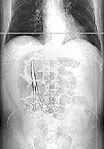|
Surgical teams accidentally leave clamps, sponges and other tools inside about 1,500 patients nationwide each year.
 The mistakes largely result not from surgeon fatigue, but from the stress arising from emergencies or complications discovered on the operating table, the researchers reported. The mistakes largely result not from surgeon fatigue, but from the stress arising from emergencies or complications discovered on the operating table, the researchers reported.
The study found that emergency operations are nine times more likely to lead to such mistakes, and operating-room complications requiring a change in procedure are four times more likely.
It also happens more often to fat patients, simply because there is more room inside them to lose equipment, according to the study.
Two-thirds of the mistakes happened even though the equipment was counted before and after the procedure, in keeping with the standard practice.
Most lost objects were sponges, but also included were metal clamps and electrodes. In two cases, 11-inch retractors metal strips were forgotten inside patients. In another operation, four sponges were left inside someone.
The lost objects were usually lodged around the abdomen or hips but sometimes in the chest. They often caused tears, obstructions or infections. Most patients needed additional surgery to remove the object. In other cases, patients were not even aware of the object, and it turned up in later surgery for other problems.
(Agencies)
|
在美國,每年約有1500名病人體內留有糊涂醫生做手術時忘記收拾的鉗子、紗布及其他工具。
研究人員發現,這些錯誤的發生大都不是因為手術疲勞,而是手術壓力。這些壓力主要來自緊急情況或者手術進行中發現的并發癥等等。
研究顯示,緊急手術中發生這類事故的幾率是常規手術的9倍。如果在手術時發現有其他并發癥而不得不調整手術程序的話,發生遺留事故的可能性是平常的4倍。
研究還表明,這類情況經常發生在體型肥胖的病人身上,因為在他們體內有更大的空間讓醫生落下東西。
按照常規,手術前后必須清點醫療工具。然而這類醫療事故中有三分之二是在常規清點工作已經進行的情況下發生的。
落在病人體內的絕大部分是醫用紗布,但也不乏金屬鉗和電極。在兩起事故中,醫生把長達11英寸的牽開器金屬條落在病人體內。而另一例事故中,病人體內一次落下了四塊紗布。
這些東西通常是遺失在病人的腹部或臀部,但有時也會在胸部。這些遺留物會引起病人的傷口撕裂、梗塞及感染。大部分病人都需要再做一次手術來取出那些異物,但有時病人根本毫無察覺,體內的東西直到進行其他手術時才被發現。
(中國日報網站譯)
|
